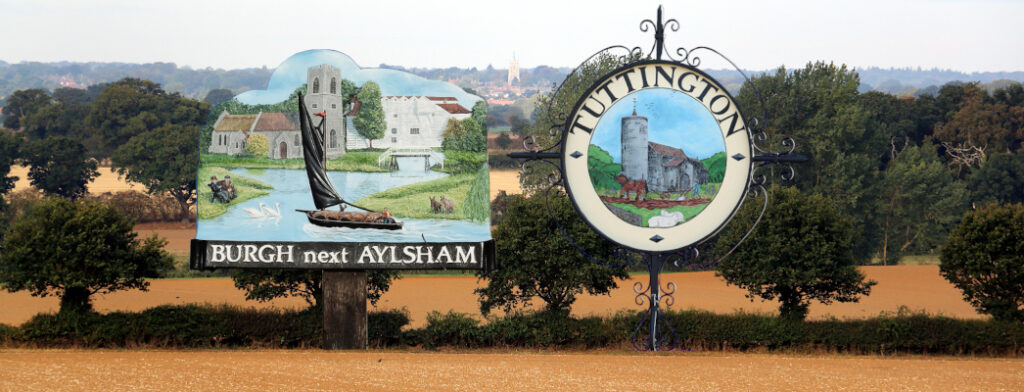Offshore wind farms and onshore cable trenches
Wind farms help the nation to achieve zero carbon energy generation during a worrying era of climate change. For several decades, Norfolk has been a focal point for bringing energy ashore, first with gas from under the North Sea and now with wind generated energy above it.
One consequence of the rapid and much-needed expansion of offshore wind turbine farms is the requirement to bring the electricity ashore and connect it to the national grid. The Burgh and Tuttington Parish Council have made representations during the consultation stages into proposed development of larger wind farms off the north Norfolk coast near Weybourne (Hornsea 3 by Orsted; Dudgeon and Sheringham Shoal by Equinor) and off the east Norfolk coast near Happisburgh (Vanguard and Boreas wind farms by Vattenfall).
We have expressed our concern at the digging and re-digging of wide cable trenches from north Norfolk to an electricity substation south of Norwich and passing just west of Aylsham, and another from the east coast to a substation at Necton near Swaffham with the trench passing just north of Banningham. In a letter to Broadland MP Jerome Mayhew, the Parish Council expressed support for further offshore wind farm development as well as the a proposed new offshore ring main to minimise the proliferation of multiple onshore cable trenches.
Greater Norwich Local Plan (GNLP)
The GNLP aims to co-ordinate development of new areas of residential housing, business and infrastructure in Greater Norwich, Broadland and South Norfolk. This is a wide-ranging plan that has identified sites for potential development in established towns and larger villages in the region. In the immediate proximity to our Parish, in the first phase, potential development sites in Aylsham and Marsham were mapped out.
The Burgh and Tuttington Parish Council took part in the subsequent consultation process. Whilst we expressed support for provision of new houses in sites to the west of the Aylsham A140 bypass, we opposed excessive development in Marsham or south Aylsham which could lead to the joining of the two settlements. We also opposed excessive development in Aylsham which was not supported by matching development of new facilities such as schools and an enlarged sewerage works, or any development which risks diminishing the essential character of Aylsham and changing it to a dormitory town for Norwich.
Aylsham Sewerage works
Over-expansion of Aylsham would put pressure upon the Anglian Water Sewerage works just to the east of the A140. Treated material leaves the works and enters the river Bure on the edge of our parish and upstream of Burgh-next-Aylsham. There is understandable concern in the current climate where many sites nationwide have reported releases of untreated sewage into rivers and the sea. So far, the upper reaches of the Bure near parish have remained relatively clear. But, we are keen to keep this special chalk river free from any consequences of rapid expansion of Aylsham before any necessary upgrade of the sewerage plant has taken place.
The Burgh and Tuttington Parish Council have written to Broadland MP Jerome Mayhew and to Anglian Water to express our concern about the sewerage works keeping up with any expansion of Aylsham so as not to threaten the river reaches in Burgh and beyond to the Broads. We will maintain vigilance by asking people in the Parish to report to us any worrying changes they notice in the river.
Nutrient Neutrality
Natural England is the government-funded body which helps to manage the natural environment and contribute to sustainable development. Recently, they have introduced new rules aimed at preserving special wetlands and protecting them from excessive release of nutrients (mainly phosphate and nitrate) into river catchments by agriculture and new housing developments. Broadland is one such area and the rivers and streams that form the catchment area includes the Bure in Burgh and Kings Beck in Tuttington, and adjoining streams and field drains.
On the one hand, this seems a good way to maintain the pure water of the Broads to benefit the unique environment for animal and plant life, and help to sustain the important tourist industries that depend upon clean waterways. However, it has had a significant downside for development ranging from large housing estates down to single dwellings. At least one planning application in the Parish has been put on indefinite hold as a result of the new rules. The Parish Council will advise residents who come across problems associated with the nutrient neutrality rules.
If you are concerned about developments or impact of infrastructure changes in or adjacent to the Parish and would like advice, please contact the Parish Clerk or individual Parish Councillors.
